#how has greece not self combusted yet
Explore tagged Tumblr posts
Photo
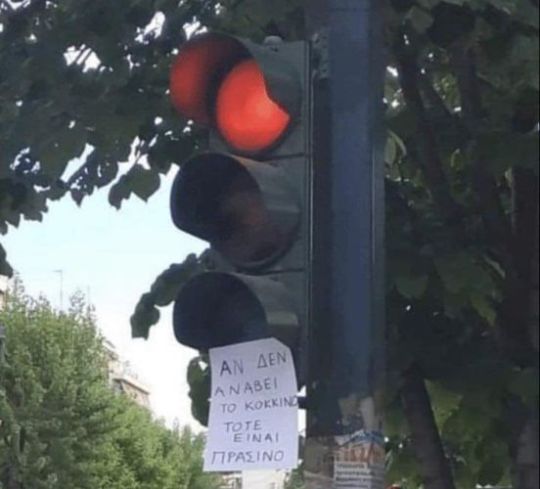
Ultimate Greece photo
(The paper reads: “If the red is not lit, then it is green”)
306 notes
·
View notes
Text
Wonder Woman Annual #2
Previously in FUCKITY FUCK FUCK I FORGOT THERE WAS AN ANNUAL AS WELL: Diana prepared to face down her most terrifying foes yet: the Dark Gods.
Who or what are the Dark Gods? Dunno.
What do they want? No clue.
What is this awesome and terrible power that they wield? So far, mostly just the ability to shoot lasers out of their eyes and incite people to deliver badly-written villainous monologues.
Why are we supposed to be so pants-pissingly afraid of them? Because James Robinson told us so.
Last issue ended with the Dark Gods manifesting over Washington DC, at which point it was revealed that they are… giant floating statues, I guess? But, like, scary floating statues. With lasers. So scary.
And then moments later, a couple of Star Sapphires arrived to whisk Diana away so she could appear in this shitty annual.
Diana is teleported to the Star Sapphires’ home planet of Zamaron, which is heavily battle-damaged.
The two Sapphires who brought her here are called Miss Bloss and Miri Riam, who are apparently pre-established minor Green Lantern characters — something I had to figure out on my own, because Robinson just assumes we all known them, and that Diana does too (I’m reasonably sure they’ve never met). The one time his overexplaining might have actually been useful, and he couldn’t be arsed taking a panel or two to make introductions.
Diana yells at them that she’s too busy to help with whatever their deal is, and launches into a recap of last issue. But, you know, that was all of two weeks ago, so by all means, spend a page getting us up to speed.
She’s also still throwing around ‘crazy’ and ‘insane’ like they’re going out of style.
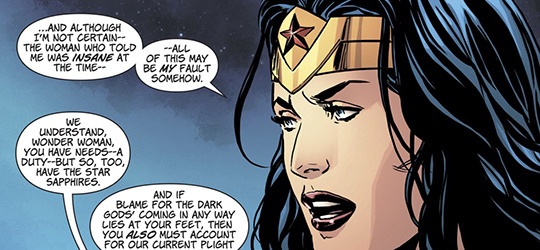
“…and although I’m not certain — the woman who told me was insane at the time--“
How about ‘possessed’, ‘out of control’, ‘somewhat incoherent’ or ‘compromised’? Any of these would be more accurate in this context, as well as not equating mental illness with dangerous and violent behaviour.
But anyway, essentially Diana says ‘my world is being attacked by the Dark Gods and it’s my fault’, and Miss Bloss is like, ‘well, if that was your fault, then our thing must be your fault, too’, and points up at the giant floating Dark God statue thing that Diana has somehow failed to notice until this exact moment.
Oh, goody.
Diana starts questioning them about what happened. Honestly, that’s really all she does these days. If she’s not delivering plot recaps herself, she’s setting up allies for flashback-exposition or allowing villains to monologue at her. Oh, sure, occasionally she fights somebody, but mostly she’s just a vessel for tedious exposition.
Miss Bloss describes the Dark God’s attack:
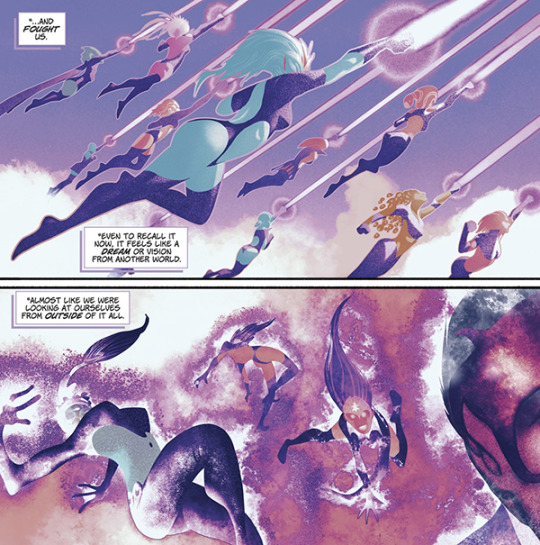
“Even to recall it now, it feels like a dream or vision from another world. Almost like we were looking at ourselves from outside of it all.”
The first time I read this, I took it to be a figure of speech. I interpreted it as an expression of Miss Bloss’s deep level of shock at the devastation she’d experienced, that it still felt unreal, as though it had happened to somebody else.
I was giving Robinson too much credit: he meant it literally.
As we’ll learn in a few pages’ time, one of the Dark Gods has some kind of power over people’s perceptions, enabling him to induce in others a sense of unreality and dreamlike detachment. We’ll learn that the Dark Gods have deliberately used this ability in order to confuse enemies and limit their ability to respond to or even comprehend attacks.
Frazer Irving — who illustrates the flashback, along with a couple of other scenes in this issue — plays into this well. His stylised art and colour work lends a somewhat eerie dreamlike quality to his pages, creating a sense of altered reality.
Unfortunately, Robinson can’t write dreamlike.
So what in theory should be an eerie, confusing, unreal flashback instead just turns into Miss Bloss telling us that her memories of the attack are eerie and unreal and hazy… aaaaand then proceeding to describe the attack, the enemy, his name, the concept he embodies, his powers and the precise reason why he was able to kill so many Star Sapphires, all in exacting detail.
The Dark God who attacked the Sapphires is called Karnell and he calls himself the god of love, but the love he embodies is dark and gritty and edgy and corrupted. He can sense any ‘impurities’ or ‘flaws’ in a person’s love and rub it in their faces. When he does this to Star Sapphires, something something their rings freak out and they spontaneously combust.
Diana asks, ‘yeah okay, but you didn’t know that this was my fault when you dragged me here, so what gives?’, and Bloss and Miri are like, ‘welp, our leaders are all dead, Carol Ferris is busy in another comic, we all frankly suck, and you were a Star Sapphire once in that Blackest Night crossover event.’
At which point I went, ‘wait huh what??? but that was before the New 52 reboot!’, before remembering that Geoff Johns’ entire preboot GL run survived the reboot for no other reason than because Geoff Johns gets whatever he wants.
Diana agrees to lead the Sapphires against Krakoom (I’m sorry, I’m not going to bother to learn his name, he’s not worth that kind of time), and the Sapphires respond by giving her the Nazi salute due to an unfortunate artistic miscalculation.
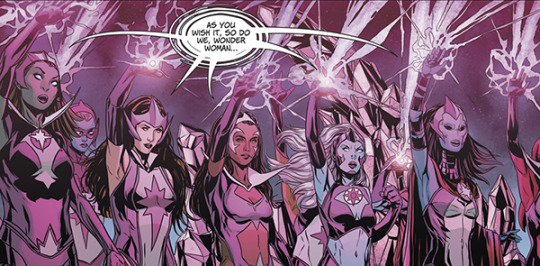
Diana: And if I am going to stand among you — fight alongside you — let me look the part. Sapphires: As you wish it, so do we, Wonder Woman… be a Star Sapphire once more.
And with that, they give Diana a makeover.
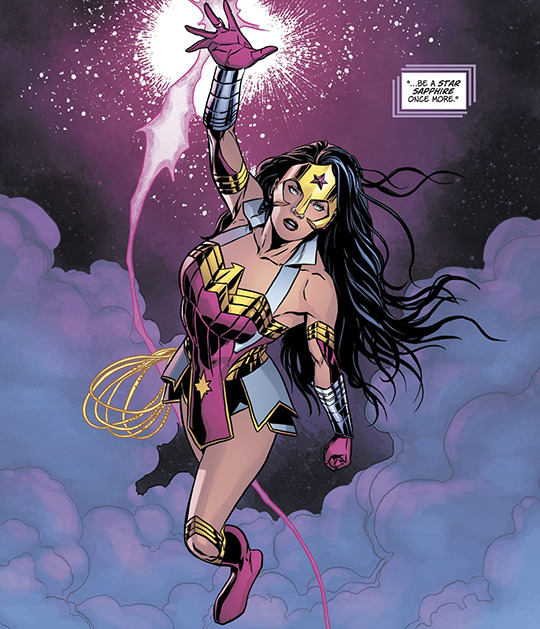
It’s not a bad costume, especially when you compare it to her Blackest Night design. That one tried to ape Carol Ferris’ hideous then-costume, which featured hip cut-outs and a plummeting neckline that ended around the crotch area, by giving Diana a bathing suit with hip-holes and a bared midriff. This design retains many familiar Star Sapphire costume elements — the stiff pointed white collar, the combination tiara/mask, the starburst symbol, the long gloves and high boots — without going into creepy male-gazey territory.
buuuuut it also looks like Diana is wearing a pink apron over her usual costume, and that is something I cannot get past. It also varies wildly across the issue, depending on which of the four credited artists is drawing it.
By the way, I say ‘makeover’ because despite violet blaze on her right ring finger, it took me several times flicking back and forth before I was certain that Diana had been deputised into the Corps as opposed to just being given a new costume in order to “look the part”, as she put it. I know this sounds like it should have been self-evident, but Robinson gives absolutely no indication of any deeper change in her. Not even lip service to the fact that Diana is connected, through the power ring, to the emotional spectrum and the violet energies of love.
Contrast this with Diana in Blackest Night: Wonder Woman #3:
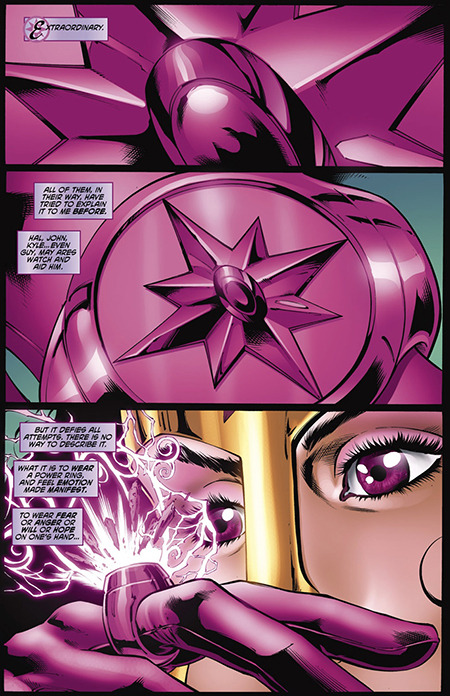
“Extraordinary. All of them, in their way, have tried to explain it to me before. Hal, John, Kyle… even Guy, may Ares watch and aid him. But it defies all attempts. There is no way to describe it. What it is to wear a power ring, and feel emotion made manifest. To wear fear on anger or will or hope on one’s hand… To wear love. Too beautiful for words…”
There’s a lot about Wondy’s Blackest Night tie-in that’s flawed and frustrating and flat-out bad, but this page gets it right. If you’re going to make Diana a Star Sapphire — going to give one of the most loving hearts of the DCU the power to channel her love into tangible power — then you need to acknowledge the weight of that.
In this comic, it’s as insubstantial as a costume change.
Flying up to confront Kratakoa, Diana wonders if she could really have summoned the Dark Gods. Supergirl said she brought them into this plane with a careless wish, and… oh, come to think of it, she did inadvertently make a wish during the recent Dark Nights: Metal crossover, while coincidentally handling some magical wishing metal. But nah, that couldn’t possibly have done it!

She reaches the big floaty statue and a bloke with spiky wings emerges from it. It’s Klangalang, and he’s got his monologue cued up and ready to go!
He opens with a fairly standard ‘ahaha, I’ve been expecting you, hero!’, and the implications fly straight over Diana’s head.
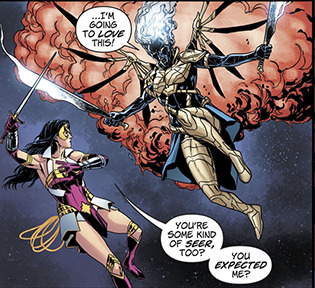
Kibble: You came, Amazon! Sooner than I expected, too! Good… I’m going to love this! Diana: You’re some kind of seer, too? You expected me?

Let’s review: The villains Diana supposedly summoned, the villains who have been trying to kill or neutralise Diana before she can interfere in their plans, have attacked the Star Sapphires in advance of their invasion of Earth. Despite not knowing about Diana’s connection to their attacker, the Sapphires reached out to her for help, teleporting her away at almost the exact moment that the villains launched their opening assault. Now the one villain who hasn’t joined the invading force is cackling that he’s been expecting Diana.
Even a half-competent hero should be able to join the dots and realise they’ve been deliberately lured away. Not so Robinson’s Diana, who gazes at him wide-eyed and demands, ‘omg, u expected me? are u psychic or sumthin???’
After a couple more rounds of obscenely dense questions from Diana (along with another out-of-character ’crazy’ slur), Klunk ends up having to straight-up spell it out for her. He also explains how she summoned the Dark Gods.
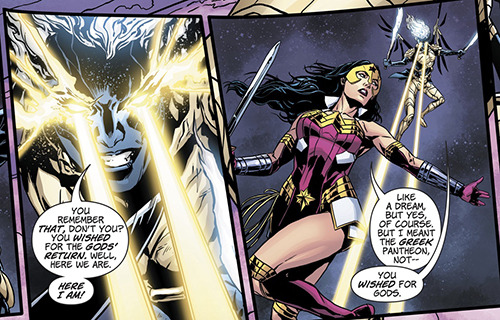
Krunch: You wished for the gods’ return. Well, here we are. Here I am! Diana: Like a dream, but yes, of course. But I meant the Greek pantheon, not— Krump: Gods! That’s all you said.
Small nitpick: Diana would not think of her gods the “Greek pantheon”. She’d be more likely to call them “the Patrons”, “my gods”, “the gods of my people”, “the gods of Themyscira”, “the gods of Olympus”, “the Olympians” — she knew them as all of these things long before she knew Greece, or any world outside her island home, existed. The only reason she might refer to them as “Greek” is for the benefit of people in Man’s World, as a point of reference.
More importantly, are you friggin kidding me, the friggin layers of incompetence here from our supposed hero
accidentally makes a wish while wielding a weapon of magical wishing metal
manages to make the vaguest wish possible, opening a loophole for THE WORST GODS to infiltrate reality
immediately forgets she ever wished it
why would she even wish for that?! her gods haven’t gone anywhere!
To be somewhat fair, the reason she doesn’t really remember it is that “the God With No Name” (YES REALLY) made it all feel like a dream so that she wouldn’t realise she’d made an irresponsible wish and needed to immediately rally everybody together to resist the Dark Gods.
Except… that in itself doesn’t make any sense.
There are two possibilities here: the Horse With No Name could have clouded Diana’s memory of making the wish after the Dark Gods were pulled into this reality — in which case, why? How would she even land on the conclusion that she’d accidentally summoned some evil gods that she’d never heard of, when her intent was to call on her own gods and she’d had no indication that it had even worked?
Alternatively, he clouded her mind in the moment of the wish, to render her thoughts vague and imprecise and open the door for the Dark Gods’ invasion. Which doesn’t work either, because it turns out that the Dark Gods are pretty pissed off at being pulled out of their awesome reality.
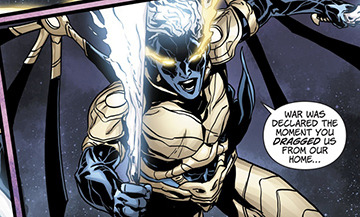
King Koopa: War was declared the moment you dragged us from our home… our beautiful world — which you regard as the ‘Dark Multiverse’ — we see as a paradise… where we were more than even gods to our worshippers… we were everything!”
So basically their plan is to turn Earth into a desolate hellscape just like their home.
Diana, who has already been told that Kraig is a god of corrupted love, conveniently forgets this fact just so that Robinson can tell it to us again.
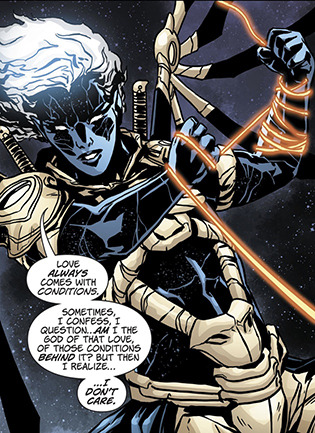
Diana: You call yourself a god of love. What kind of love wants to be feared? Love is unconditional. KHAAAAAN: Spoken like the addled naive romantic I expected. Love always comes with conditions. Sometimes, I confess, I question… am I god of that love, of those conditions behind it? But then I realise… I don’t care.
Cool story. Glad we can agree on one thing, at least.
He monologues for a couple of pages about how he’s going to open her eyes to the truth of how horrible and selfish and corrupt love is, then draws Diana into his mind so that he can monologue some more.
We learn that the world of the Dark Gods was forged by a group of divinities called Titans, “much like the reality of your own Greek pantheon” (incorrect, you’re thinking of the Protogenoi; the Titans were the second generation of gods). But because these Titans were hardcore, they did it by smashing five other realities together. And into this terrifyingly dark edgy metalscape came… +~teh D4rK g0dz~+
Robinson then undermines the super-extra-double-dark feel he’s going for with another embarrassing name and an accidental rhyme.
“We Dark Gods followed, as gods do. King Best and then the rest.”
KING. BEST.

But wait, we haven’t even gotten to Kalamazoo’s dark edgy totally original backstory!
In fact, this is so dark and edgy and original that I’ll throw in a quick content warning here for descriptions of domestic violence and shittiness towards sex workers.
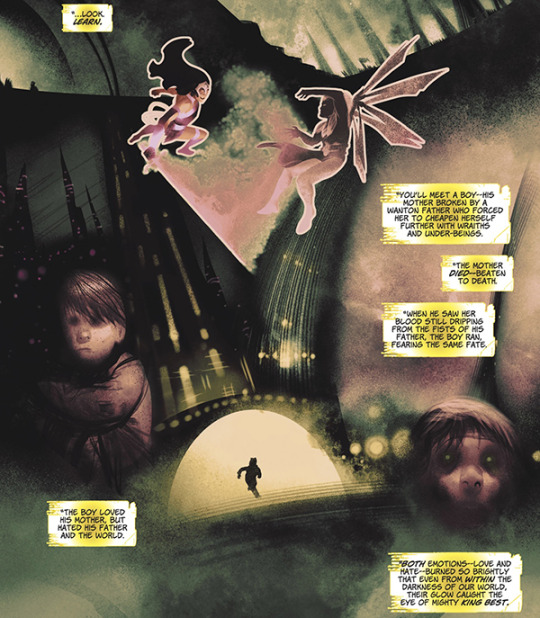
“You’ll meet a boy — his mother broken by a wanton father who forced her to cheapen herself further with wraiths and under-beings. The mother died — beaten to death. When he saw her blood still dripping from the fists of his father, the boy ran, fearing the same fate. The boy loved his mother, but hated his father and the world. Both emotions — love and hate — burned so brightly that even from within the darkness of our world, their glow caught the eye of mighty King Best.”
Domestic violence! Sexism! Slut shaming! Fridging! It’s like a game of grimdark bingo!
After three goddamn pages of this, Diana suddenly twigs what we all figured out eleven pages ago, ‘oh now waaaaaait a minute, you didn’t lure me here so that your buddies could invade Earth while I’m distracted, did you?’
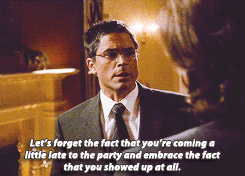
Klinger responds by almost murdering Diana, and is only stopped by the intervention of the Star Sapphires. They all retreat, and Diana proposes a new plan: all the Sapphires will channel their energy into her, something something, true love wins the day.
So Diana flies up to Kimberley, sword held aloft and blazing with violet energy, and announces, ‘boy did you make a mistake when you told me that you used to be a sad boy child! now I have only love in my heart for you!’
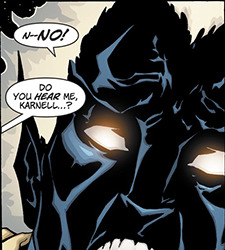
Karma Khameleon is like, ‘oh no, love! my one true weakness!’, and I’m like, “d… didn’t we just have this story?”
Then Diana straight-up stabs him with her love sword, and Korgo fades away with an ‘I’ll beat you next time, Captain Planet! Next tiiiiiime…’
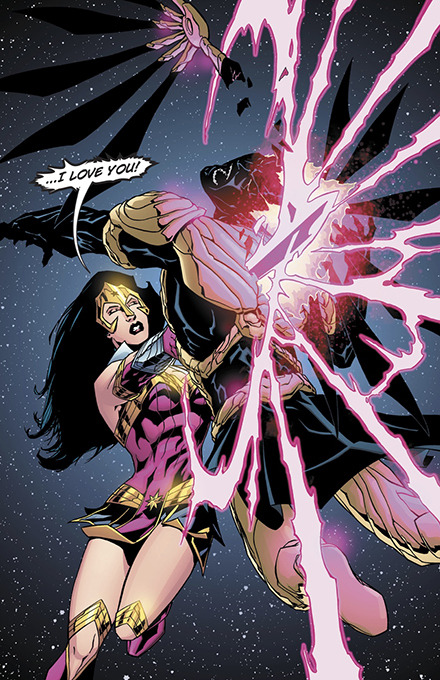
Diana farewells the Star Sapphires, and Robinson shoehorns in this bit of virtue signalling:
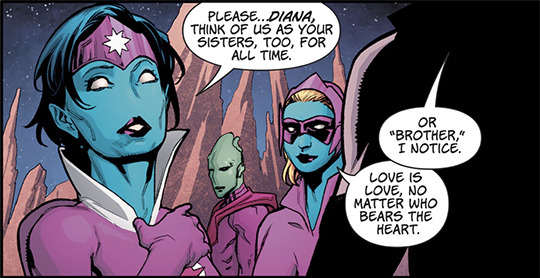
Miri: Please… Diana, think of us as your sisters, too, for all time. Diana: Or “brother,” I notice. Miss Bloss: Love is love, no matter who bears the heart.
This is a welcome and needed change to the Star Sapphires. The fact that they have been portrayed up until this point as an all-women corps (with the exception of a few briefly deputised blokes) is bound up in ugly gendered ideas, exemplified by Geoff Johns’ comment in 2009 that “anyone can join, but most men are not worthy”.
But there’s something gratingly self-congratulatory in the execution of this course correction. Robinson’s doing the absolute bare minimum here — including one or two male background characters in a handful of panels — and flagging it as progress with a phrase associated with the LGBTI community. We haven’t even seen a single named male Sapphire, let alone one with a speaking part; I think it’s a little premature to be looking for kudos. And either Miri or Miss Bloss could very easily have been replaced in this story by a new male character.
The Sapphires teleport Diana back to Earth, where she finds DC a smoking ruin. And as the air clears, she sees—
—wait for it—
—this is truly shocking and terrifying—
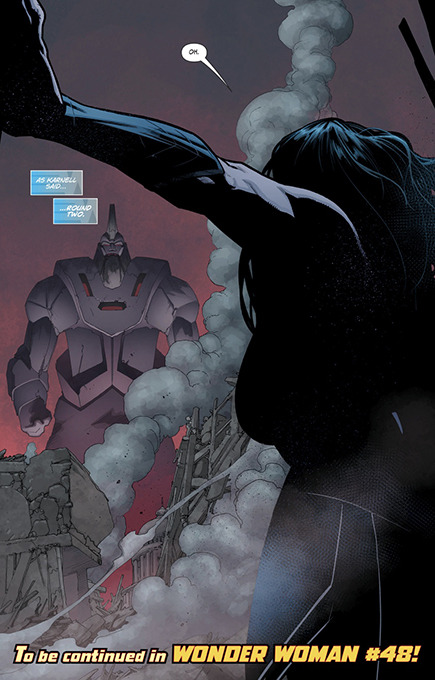

THE DARK GODS MADE A MEGAZORD
THEY MADE A FUCKING MEGAZORD WITH THEIR DUMBASS FLYING STATUES
A GODDAMN MEGAZORD WHO WHAT HOW WHY.
Diana’s face does this:
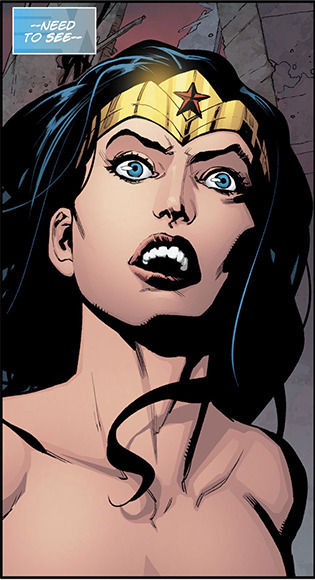
17 notes
·
View notes
Text
We Shall Overcome
John Sawyer
Bedford Presbyterian Church
5 / 9 / 21 – Sixth Sunday of Easter / Mother’s Day
1 John 5:1-6
John 15:9-17
“We Shall Overcome”
(Love Conquers All)
I don’t necessarily want to start today’s sermon on a down-note – it is Mother’s Day, after all. But, over the past year, we have seen how easy it is for a microscopic virus to conquer the world. We are also seeing, though, signs of hope as vaccines fight back, slowly retaking and remaking the world, dose by dose, person by person. It would seem that we are still very much in a battle with Covid-19. I have hope that human beings will prevail in the end – that, as the old song goes, “We shall overcome, someday”[1] – but how long will it take? What will it take?
What does it take to conquer the world? Well, if you’re talking about a virus like Covid-19, all it might take is a sneeze, or a cough, or just someone else’s speaking or singing, multiplied by millions of cases. But if you’re talking about something else conquering the world – like rock n’ roll or K-Pop, like Coca-Cola or McDonald’s or Starbucks, like the internal combustion engine or the internet – sometimes all it takes is a catchy tune, or the right marketing strategy, or some form of technology that creates a way of life that is easier, or just more appealing.
Today’s two readings from scripture reveal the secret behind the marketing strategy for the followers of Jesus – a strategy for conquering the world. In today’s first reading from the Gospel of John, we see the pitch meeting, in which Jesus lays out his marketing plan. There is no Don Draper in this meeting – no PR firm or social media influencers – there is just a gathering of twelve disciples (and, likely, a few others) who are having dinner with Jesus. During this dinner, Jesus does a curious thing. He gets up from the table, wraps a towel around his waist, pours water into a bowl, and goes around the room washing his disciples’ feet. A little later, after dinner, in today’s passage, Jesus tells them – and, I’m paraphrasing here:
“God loves me with all of the love a parent can offer, and I love you with this same love. Abide in this love, because God’s love brings joy – to both me and you. This is my commandment, that you love one another as I have loved you. The greatest love is a sacrificial love – a self-sacrificial love – like if you lay down your life for your friends. You are my friends if you do what I command you and I am commanding you to love one another. You are not my servants. You are my friends. You did not choose me, but I chose you to go and bear fruit, fruit that will last.”[2]
Did you catch it? Did you see Jesus’ big marketing pitch? Here is a collection of former subsistence fishermen, and tax collectors, and sinners, and regular people like you and me whose lives have been changed by Jesus. And they have gotten used to sitting at Jesus’ feet so they can learn from the master – who works miracles and whose words reshape the world around them. But, over the course of a single meal – by washing their feet and calling them friends – Jesus elevates them to not just be his disciples or students anymore, but to be his partners. Jesus updates their status and empowers them to go out and bear fruit – to conquer the world in a way that is powerful and lasting with the love of God.
This love isn’t a virus and it isn’t some kind of product that can be packaged or sold. No, the love of Jesus is a Holy idea and Holy act from the heart and mind of God that gives birth to a movement – a movement that crosses countries and continents and oceans, a movement that conquers hearts and minds, a movement that breaks down dividing walls, a movement that shapes the future. God and God’s love give birth to this movement and give it feet and hands as God calls us to be partners in all of it as God’s own children.
We see this at work in today’s passage from the First Letter of John, which was written a few years after that important foot-washing dinner with Jesus. By the time this letter is written, the friends of Jesus are scattered across the known world – from Rome and Greece and present-day Turkey to Egypt and Ethiopia and beyond. And this short letter is shared with some of the friends of Jesus who find themselves in need of some encouragement and empowerment all over again.
In today’s reading, the friends of Jesus are reminded that they belong to God. They are not some forgotten people in some far-flung place. Instead, we read that, “If you have placed your trust in Jesus Christ, then you are God’s child. And, anyone who loves God loves the One whom God sent into the world – Jesus Christ. And, if we obey the commandment to love one another, then this is how our love of God is seen and known.”[3]
This is good news, but it is also shocking news – that God would use human beings such as ourselves, as fallen and fragile as we are. We are not capable of loving or believing on our own. If left to our own devices, we would not love or believe, but, as Paul writes, “God’s love has been poured into our hearts through the Holy Spirit that has been given to us.” (Romans 5:5) As we read last week, love comes from God[4] and God has loved us first.[5]
It is this love that will conquer the world.
Now, we probably need to look at what these words mean and what the author of today’s passage means by “whatever is born of God conquers the world. . .” (1 John 5:4) Because history is filled with examples of those who claim to love God and God’s Son, Jesus, who have done horrific things, in attempting to “conquer the world.” From the Crusaders to the Conquistadores to various church movements in our own time, some Christians have had and do have some sort of conquest on their minds – sometimes literal conquest – and this has not always ended well for the world or the church.
As a child, I remember singing a song in church with the words, “Onward Christian soldiers, marching as to war, with the cross of Jesus going on before. . .”[6] And, over the years, some Christians have – rightly or wrongly – sung this, and meant it literally.
So, what does it mean in today’s reading, when it says “whatever is born of God conquers the world”? Well, in the original language, the word that is translated as “conquer” – can also be translated “victory” or “overcomes,”[7] as in, “whatever is born of God overcomes the world.” It also should be noted, that in the original language “the world” is the planet earth, but it is also “the world” as it stands in stark spiritual “contrast to heaven”.[8] In other words, today’s reading might not be pointing toward a literal conquest of the world as much as it is encouraging those of us who read these words to understand that God’s love and the faith that this love inspires helps us to overcome all of the struggles – be they physical or spiritual – that the world may throw at us. . . pandemics, poverty, political division, hatred, oppression, divorce, disease, even death itself. . . In the end, the love of God is the only thing that will help us overcome all of it – all of these struggles, and so much more.
As the friends of Jesus, you and I have been given the love that we need to overcome the world – not that we still will not struggle, though. . . not that the world will not still give us more than we feel we can handle. Because the world will often do this to us. But it is in the midst of struggle when the love of God and faith that the Holy Spirit inspires are most essential and most at work – even on days when we struggle to know love and struggle to believe. Jesus, too, knows what struggles we experience. Jesus, too, knows how hard a crisis of faith can be. And yet, Jesus, too, knows and is love. . . love for us. . . love for his friends. . . love for you and me. It is this love that overcomes the world, this love that gives victory in the end, this love that bears the fruit that will last in us and through us.
I’ll close with this. . . During the Civil Rights era of the 1960’s, the song “We Shall Overcome” became an anthem among the nonviolent protestors who marched for, among other things, the right to vote. At the time, this movement – and their leaders – were not overwhelmingly popular across the country. Perhaps the change that they so longed for and marched for and died for was a lot more than some folks could stomach. But the beautiful thing about “We Shall Overcome” is that it casts a vision of what is possible with God’s help. It casts a vision of overcoming the struggles of this world with peace and love – God’s peace and love – the kind of peace and love that are only possible because they are from God and God will see them through – in us and through us.
Back in the summer of 1964, when Freedom Riders arrived in Mississippi under the threat of violence to work for the right for all people to vote, they sang “We Shall Overcome” at the end of most of their meetings, which took place in churches. At the end of that summer, a group of these people, including Fannie Lou Hamer, a poor sharecropper whose singing helped define the tone of peaceful protest, went to the Democratic National Convention in Atlantic City, New Jersey. They went there to be seen and heard as standing up against the all-white segregationist delegation from Mississippi, and seen and heard they were. On the last night of the convention, they held a final vigil out on the Atlantic City boardwalk – turning the boardwalk into an impromptu sanctuary. As one writer remembers:
. . . we stood and sang “We Shall Overcome” – remembering all the impossible times, unlike any others, when we had sung it before. The only song that has no clapping, because the hands are holding all the other hands. A suspension from color, hate, recrimination, guilt, suffering – a kind of lesson in miniature of what it’s all about. The song begins slowly and somehow without anticipation of these things: just a song, the last one before we separate. You see the [other singers], and the instant when it comes to each one to think what the words mean, when each merely breaks, wondering: shall we overcome? The hands hold each other tighter. Mrs. Hamer is smiling, flinging out the words, and crying at once. “Black and white together,” she leads the next verse, and a sort of joy begins to grow in every face; “We are not afraid” – and for just that second no one is afraid, because they are free.[9]
Friends of Jesus, shall we overcome?
What does it take to conquer the world? What it really takes is the love that has already conquered the world – the love that sets us, and everyone else, free.
May we trust in this love and share this love as we love one another – for it is only through this love and by this love that we shall overcome.
In the name of the Father, and of the Son, and of the Holy Spirit. Amen.
---------
[1] Text and Music: African American Spiritual (traditional), “We Shall Overcome.” Glory to God – The Presbyterian Hymnal (Louisville: Westminster John Knox Press, 2013) # 379.
[2] John 15:9-16. Paraphrased, JHS.
[3] 1 John 5:1-3 – Paraphrased, JHS.
[4] See 1 John 4:7.
[5] See 1 John 4:10.
[6] https://en.wikipedia.org/wiki/Onward,_Christian_Soldiers.
[7] Walter Bauer, A Greek-English Lexicon of the New Testament and Other Early Christian Literature (Chicago: University of Chicago Press, 1979) 539.
[8] Walter Bauer, 446.
[9] Charles Marsh, God’s Long Summer – Stories of Faith and Civil Rights (Princeton: Princeton University Press, 1997) 43. Quote from Sally Belfrage, “Freedom Summer.”
0 notes